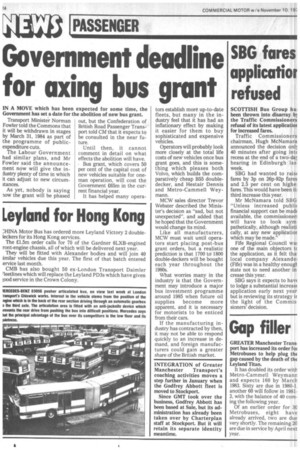Government deadline for axing bus grant
Page 26

If you've noticed an error in this article please click here to report it so we can fix it.
IN A MOVE which has been expected for some time, the Government has set a date for the abolition of new bus grant.
Transport Minister Norman Fowler told the Commons that it will be withdrawn in stages by March 31, 1984 as part of the programme of publicexpenditure cuts.
The Labour Government had similar plans, and Mr Fowler said the announcement now will give the inJustry plenty of time in which it can adjust to new circum;lances.
As yet, nobody is saying iow the grant will be phased out, but the Confederation of British Road Passenger Transport told CM that it expects to be consulted in the near future.
Until then, it cannot comment in detail on what effects the abolition will have.
Bus grant, which covers 50 per cent of the capital cost of new vehicles suitable for oneman operation, will cost the Government .E65m in the current financial year.
It has helped many opera tors establish more up-to-date fleets, but many in the industry feel that it has had an inflationary effect by making it easier for them to buy sophisticated and expensive vehicles.
Operators will probably look more closely at the total life costs of new vehicles once bus grant goes, and this is something which pleases both Volvo, which builds the comparatively cheap B55 doubledecker, and Hestair Dennis and Metro-Cammell Weymann.
MCW sales director Trevor Webster described the Minister's decision as "sad, but not unexpected", and added that he hoped that the Government would change its mind.
Like all manufacturers, MCW must wait until operators start placing post-bus grant orders, but a realistic prediction is that 1700 to 1800 double-deckers will be bought each year throughout the 1980s.
What worries many in the industry is that the Government may introduce a major bus investment programme around 1985 when future oil supplies become more apparent, and it is necessary for motorists to be enticed from their cars.
If the manufacturing industry has contracted by then, it may not be able to respond quickly to an increase in demand, and foreign manufacturers could gain a greater share of the British market.












































































































































































































































